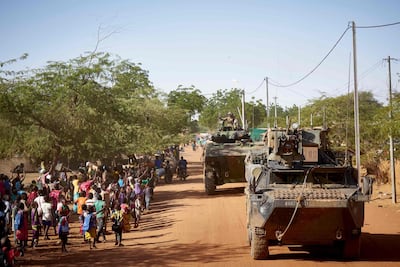France has launched a coalition of European and West African allies to fight rising extremism in the Sahel region in an attempt to boost political co-operation and secure more special forces support for military operations.
Countries, including Saudi Arabia and the United Arab Emirates, will also provide extra financial aid to the revamped coalition.
French forces first intervened in Mali in 2014 to fend off an insurgency threatening the stability of its former colonies. But several extremist groups, including some tied to Al Qaeda and ISIS, have continued to push out across a belt of northern Africa running from the Atlantic to the Red Sea.
Paris, which now has more than 5,000 troops stationed in the arid region south of the Sahara, has long sought greater input from other European countries and better co-operation between states in the region.
French Foreign Minister Yves Le Drian hailed the launch as "a good example of the new multilateralism that the world needs today".
The coalition, first announced at a January summit after a series of attacks killing over 200 soldiers, was ratified during virtual meetings of more than 40 defence and foreign ministers.
Niger's Foreign Minister Kall Ankourao said: "We can now hope that the setbacks suffered by our armies during the second half of 2019 and the difficulties implementing our development projects are behind us."
The new structure brings the so-called G5 Sahel states of Mali, Burkina Faso, Chad, Niger and Mauritania, plus French forces and any future troops under a single command, and also coordinates development, governance and humanitarian work.
Paris has long sought more support from other European countries and cooperation between Sahel states.
Ahead of the launch at the French president’s office, a senior official said: "Today in the Sahel, victory is possible. Our partners are becoming aware of that.”
Despite recent successes, including the killing of Al Qaeda's North Africa chief, Abdelmalek Droukdel, near Mali’s border with Algeria, violent Islamist groups continue to carry out devastating attacks.

Militants are increasingly active in the region’s southern frontier. Earlier this week, at least 10 soldiers were killed and six others wounded when extremist fighters attacked at an Ivory Coast outpost near the border with Burkina Faso.
Britain said on Friday that it was extending its military deployment in Mali in support of counter-terrorism operations.
The UK contributes three Chinook transport helicopters as well as some 100 personnel to support the French-led operation Barkhane, which aims to deny a safe haven for Islamist groups in the region planning attacks on Europe.
The Armed Forces Minister, James Heappey, said: “Combating extremism in the Sahel is vital for the security of the wider region and the UK will play its part tackling the declining security situation.

“West Africa is as important to the United Kingdom as it has ever been and we have many friends and allies in the region who share our desire to promote peace and prosperity.”
British troops arrived in Mali in 2018 and, though they have only been deployed in non-combat roles, have provided logistical support to French forces.
Later this year, an additional 250 British personnel are due to be deployed to the United Nations peacekeeping mission in Mali, which Britain says will bolster the authority of the Malian government.


